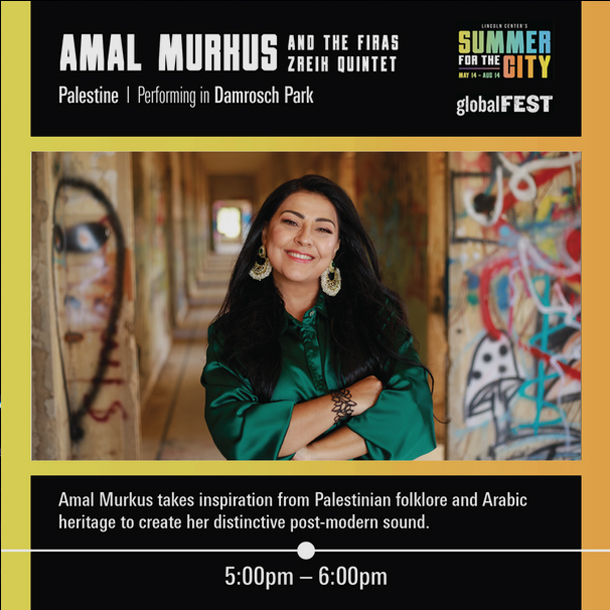Damrosch Park, Lincoln Center, New York City
July 30th, 2022
Lincoln Center (NYC) presented a terrific free concert in Damrosch Park on July 30th. Amal Murkus & The Firas Zreik Quintet gave us an hour of music. The front artists are Palestinian. The music was traditional with contemporary influence, and the songs were based on Palestinian folklore.
Ms. Murkus is a striking woman with long black hair who wore a long, dark dress with a sort of impressionist print. Although she sang only in Arabic, her expressive gestures and expressions clarified the lyrics for us, and I never missed English. Throughout her range, her voice can do anything, totally comfortable with trills and turns and the other fine demands of this highly melismatic music. She octavates effortlessly. And what’s more, her voice is beautiful.
Firas Zreik, who is Ms. Murkus’ son, is influenced by maqam tradition, a scale system of the eastern Mediterranean. He played the kanun, a sort of large zither with an astonishing 81 strings. The other four gentlemen in the quintet are: Elia Bishara (guitar); John Murchison (bass); Clemens Grassman (drums); Zafer Tawil (guitar, violin, riq or tambourine, darbuka or hourglass drum).
For the first song, jumpy, Ms. Murkus was accompanied by is two guitars, drums, kanun and violin. She explained that it was about happiness in building a home. The second song was more thoughtful,
about being a prisoner and having freedom. She sang in vocalese (“Aaaah”) for a passage. The third song was an ancient love song about “the meaning of love and passion”. Mr. Tawil switched from violin to
darbuka, and he would later move to guitar and riq.

The fourth song was vaguely political. It was concerned with the Arabic word doona which means both state and homeland. We don’t need to think hard to know what Ms. Murkus is alluding to. She said that the song used “an unclear metaphor” and told us “Sometimes you don’t say what you want”. We all sang doona on this song in a sort of call-response.
A later song was about keeping what our grandparents gave us and “bringing back a smile to the earth.” Who could resist this? Another was about “a woman going on her way alone”, another used a white dove as a symbol of peace, and one was a song “our grandmother sang to us” A song in the show was about a soldier going to war — with someone waiting for him at home. It started andante and switched rhythms when it took on a beat. These abrupt changes in mood are among the most wonderful aspects of Arabic music; they’re like a stage curtain being lifted. In a wonderful moment, Mr. Tamil sang with her, doubling her voice.
I was surprised that Ms. Murkus didn’t mention politics beyond that implication in the fourth song. She’s known to be an activist and a champion of the Palestinians (although she’s defied Islamic authorities
as well). She chooses to make her statement, then, by singing traditional Palestinian songs.
We do not find in Arabic music the legato of Amazing Grace or Michael Row the Boat Ashore. The kanun, with its plucked strings, disallows that articulation. As well, it’s simply not in the singing style. Mr. Zreik’s arrangements use a bass line and I missed the weightless, floating feeling that traditional Arabic music has without it. And as always, I missed receiving a program from Lincoln Center to explain the music more fully. But no matter — this was a brilliant concert. Ms. Murkus and The Firas Zreik Quintet are international talents of the first magnitude.
More about Amal Murkus


